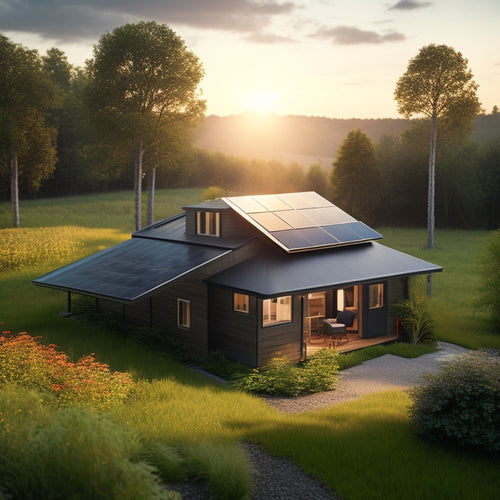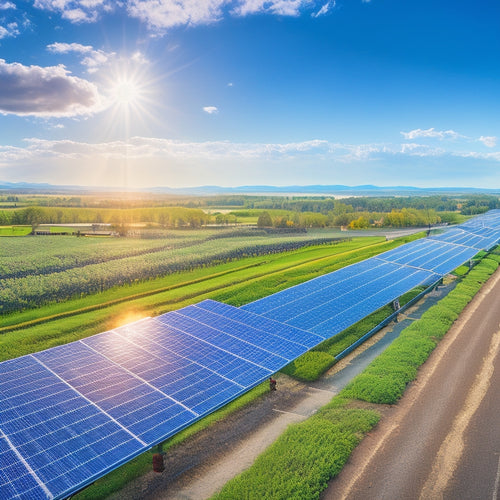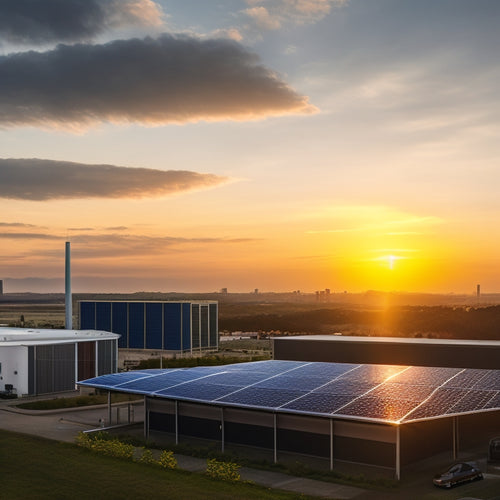
Solar Panel Inverters' Role in Monitoring Energy Production
Share
Solar panel inverters greatly improve your energy production monitoring by optimizing efficiency and providing real-time performance data. They track conversion metrics, ensuring that your solar system operates at peak performance. By identifying inefficiencies, inverters facilitate targeted improvements, maximizing your energy output. With smart grid compatibility, they enable effective data exchange, enhancing energy management. The right inverter for your system size is essential—proper selection prevents energy clipping and increases savings. Their durability also assures longevity, reducing maintenance concerns. Understanding these aspects can help you make informed decisions for your solar investment, laying the foundation for deeper understanding into solar efficiency.
At a Glance
- Solar panel inverters enhance system performance through advanced monitoring features that track energy production and identify inefficiencies in real-time.
- Performance monitoring systems ensure optimal energy conversion, confirming effective sunlight utilization and allowing for prompt adjustments to maintain peak efficiency.
- Data analytics and visualization tools enable informed decision-making by tracking performance benchmarks and identifying areas for improvement over time.
- Smart grid compatibility allows for seamless data communication, optimizing energy flow and enhancing real-time management of solar energy production.
- The selection of appropriate inverter types based on system size is crucial for maximizing energy capture and preventing production clipping during peak sunlight.
Efficiency in Energy Conversion
When you assess the efficiency of solar panel inverters, understanding conversion rate optimization is essential.
High-quality inverters employ advanced features that enhance system performance, enabling better energy management.
Implementing performance monitoring systems allows you to identify inefficiencies and enhance energy output.
Conversion Rate Optimization
Maximizing the efficiency of solar panel inverters is essential for enhancing overall energy conversion rates. By focusing on conversion metrics, you can identify key areas for improvement. Implementing optimization techniques, such as fine-tuning the user interface, allows for a more intuitive user experience, reducing the learning curve for system operators.
Performance analysis is critical in establishing efficiency benchmarks that your inverters should meet. This data helps you visualize performance through data visualization tools, making it easier to track progress over time.
System integration plays an important role, ensuring that all components work harmoniously to maximize energy output.
Creating feedback loops within the system encourages continuous improvement strategies. By regularly evaluating performance, you can pinpoint inefficiencies and take corrective actions swiftly.
This proactive approach not only enhances conversion rates but also promotes a culture of innovation and adaptability.
Performance Monitoring Systems
How do you assure that your solar panel system operates at peak efficiency? The answer lies in effective performance monitoring systems. By utilizing data analytics, you can track the performance metrics of your solar panels, confirming they convert sunlight into electricity as efficiently as possible.
These systems provide real-time observations into energy production, allowing you to identify any discrepancies or drops in output. When performance metrics indicate underperformance, you can take swift action—whether it's cleaning panels, adjusting the angle, or addressing inverter issues.
Moreover, advanced performance monitoring systems often include predictive analytics. This means you can anticipate maintenance needs before they become critical, thereby prolonging the lifespan of your system and maximizing your return on investment.
Ultimately, by integrating strong performance monitoring, you're not just investing in solar technology; you're enabling your freedom to utilize renewable energy.
With precise data at your fingertips, you can make informed decisions that enhance efficiency and confirm your solar panel system operates at its best. Accept the power of performance monitoring and enjoy a sustainable energy future that aligns with your desire for independence.
Cost Savings on Electricity
By optimizing the energy conversion process, solar panel inverters can greatly reduce your electricity bills.
They play an essential role in ensuring that the energy generated by solar panels is used efficiently, allowing homeowners to maximize their investments in renewable energy.
When paired with efficient solar panels, they maximize the amount of energy harvested, directly impacting your savings.
Understanding these interactions allows you to make informed decisions about your solar investment, especially as solar batteries enhance energy independence.
Reduced Energy Bills
Utilizing solar panel technology can greatly reduce your energy bills, providing tangible cost savings on electricity. By capturing solar energy, you can markedly lower your energy consumption, which directly impacts your monthly expenses. With solar incentives available, your initial investment can yield substantial long-term savings.
Here's a breakdown of potential savings:
| Energy Source | Monthly Cost |
|---|---|
| Traditional Grid Power | $150 |
| Solar Energy (After Incentives) | $50 |
| Savings Compared to Grid | $100 |
| Annual Savings | $1,200 |
| Payback Period (Years) | 5 |
Switching to solar means you're not only investing in your home but also reclaiming control over your energy costs. As energy prices fluctuate, having a solar system shields you from rising utility rates. Additionally, with the right solar incentives, you can offset installation costs, enhancing your financial freedom. By optimizing your energy consumption, you position yourself to enjoy lower bills and a sustainable future. The shift to solar isn't just about reducing costs; it's about embracing energy independence.
Maximized Solar Efficiency
Maximizing solar efficiency is crucial for optimizing cost savings on electricity. By utilizing advanced solar technology, you can notably enhance the performance of your solar panel system. This involves selecting high-efficiency inverters that convert more sunlight into usable energy, directly impacting your monthly utility bills. An efficient inverter not only maximizes energy production but also guarantees that your system operates at peak performance, adapting to varying environmental conditions.
Moreover, integrating monitoring systems allows you to track energy output in real-time, allowing you to identify inefficiencies promptly. This proactive approach contributes to energy sustainability, as you can make informed decisions to improve your solar setup. Regular maintenance and timely upgrades to your solar technology can further increase efficiency, translating to cost savings over time.
As you optimize your system, you gain greater freedom from fluctuating energy costs and dependence on traditional power sources. The more efficiently your solar panels operate, the more you reduce your electricity expenses, promoting a sustainable energy future.
Embracing these strategies enables you to utilize the full potential of solar energy, guaranteeing your investment pays off in the long run.
Smart Grid Compatibility
When you consider smart grid compatibility in solar panel inverters, enhanced data communication and real-time energy management become critical factors.
These features enable efficient energy distribution and consumption monitoring, allowing you to optimize your solar system's performance.
Understanding how these elements work together can greatly impact your energy efficiency and overall savings.
Enhanced Data Communication
Enhanced data communication plays an essential part in guaranteeing solar panel inverters integrate seamlessly with smart grid systems. By employing advanced data transmission technologies, these inverters can efficiently relay information regarding energy production and consumption. This communication is critical for optimizing energy flow and improving grid stability.
To achieve this, inverters need to make use of strong communication protocols that enable them to interact effectively with other components of the smart grid. These protocols facilitate real-time data exchange, allowing for better monitoring and management of energy resources. When you select an inverter, consider its compatibility with existing smart grid infrastructure; this guarantees that it can adapt to various communication standards.
Moreover, reliable data transmission not only improves operational efficiency but also empowers users like you to make informed decisions about energy usage. With enhanced communication capabilities, you gain access to information into your energy production patterns, which can lead to greater autonomy and control over your energy consumption.
Embracing these technologies will help you leverage the full potential of your solar energy system while contributing to a more resilient and flexible energy environment.
Real-Time Energy Management
Real-time energy management is essential for optimizing solar panel inverter performance within smart grid systems. By utilizing real-time analytics, you can continuously monitor and adjust energy production to meet demand flexibly. This capability not only enhances efficiency but also maximizes the value of your solar investments.
With smart grid compatibility, your solar panel inverters can communicate seamlessly with the grid, allowing for effective energy forecasting. This means you'll have access to accurate data regarding energy trends, enabling you to anticipate fluctuations in production and consumption. Such foresight enables you to make informed decisions about energy usage, storage, and even selling excess energy back to the grid.
Incorporating real-time data helps mitigate risks associated with energy supply and demand mismatches. By actively managing your energy output, you can optimize performance, reduce waste, and enhance the overall resilience of your energy system.
Ultimately, this level of control aligns perfectly with the desire for freedom in energy management, allowing you to utilize the full potential of your solar technology while contributing to a more sustainable energy future. Embracing real-time energy management reshapes how you interact with the energy environment.
Selecting Based on System Size
When selecting an inverter, you must consider its capacity in relation to your system size to guarantee peak performance.
A proper inverter not only enhances efficiency but also plays an essential role in managing energy storage, particularly when integrating with solar battery systems for best solar batteries.
Additionally, it's vital to evaluate compatibility with your specific system type, whether it's grid-tied, off-grid, or hybrid.
Understanding these factors will help you make an informed decision that maximizes energy efficiency and system reliability.
Inverter Capacity Considerations
Choosing the right inverter capacity is crucial for optimizing your solar panel system's performance. The inverter's power rating determines how much electricity it can convert from your solar panels to usable energy. If the inverter capacity is too low, you'll risk clipping your energy production, meaning you'll lose potential electricity generation on sunny days.
Conversely, an oversized inverter may lead to inefficiencies and higher costs without significant benefits.
When selecting an inverter, consider the different inverter types available—string inverters, microinverters, and power optimizers. Each type has its advantages and disadvantages depending on your system size and configuration. For example, microinverters may be more suitable for smaller systems or shaded areas, while string inverters might serve larger systems better due to their higher power ratings.
To guarantee you're making the right choice, calculate your system's total wattage and match it with an inverter that can manage that output while accounting for potential future expansions.
A well-matched inverter capacity not only boosts energy production but also contributes to the longevity and reliability of your solar panel system, granting you the freedom to utilize renewable energy efficiently.
System Type Compatibility
Understanding the compatibility of your inverter with your specific solar panel system size is crucial for maximizing efficiency and performance. Different inverter types cater to varying system sizes, impacting grid integration and overall energy production. When selecting an inverter, consider both the scale of your solar installation and the type of inverter that best suits your needs.
| Inverter Type | System Size (kW) | Grid Integration Capability |
|---|---|---|
| String Inverter | Up to 10 | Moderate |
| Microinverter | 1 - 5 | High |
| Power Optimizer | 5 - 15 | High |
| Central Inverter | 10+ | Moderate to High |
| Hybrid Inverter | Any | Very High |
Choosing the right inverter type based on your system size guarantees ideal grid integration. For smaller systems, microinverters or power optimizers may enhance energy capture, while larger setups might benefit from central inverters. By aligning inverter selection with your solar panel size and intended usage, you can achieve greater independence in your energy production and consumption.
Longer Lifespan Than Competitors
When evaluating solar panel inverters, you'll notice that those with enhanced durability features often outlast their competitors.
Manufacturers employ advanced materials and innovative designs to withstand environmental stressors, which directly impacts lifespan.
Enhanced Durability Features
In the competitive domain of solar technology, enhanced durability features in inverters greatly extend their lifespan compared to many competitors. By incorporating advanced weather resistance, these inverters can withstand harsh environmental conditions without compromising performance.
Corrosion protection is fundamental for longevity, guaranteeing that components remain functional even in high-humidity or saline environments. Effective thermal management plays an essential role in maintaining peak operating temperatures, preventing overheating, and prolonging the lifespan of internal components.
Dust protection is another important feature, as it prevents particle accumulation that could hinder performance. The design's mounting stability guarantees that the inverter remains securely attached, reducing the risk of damage from external forces.
Electrical insulation and a strong moisture barrier protect sensitive components from short circuits and water ingress, while UV resistance prevents degradation from prolonged sun exposure. Additionally, vibration tolerance helps the inverter endure mechanical stresses, particularly in areas prone to seismic activity.
Ultimately, the commitment to high component quality translates into a reliable, durable product. By investing in inverters with these enhanced durability features, you can enjoy greater energy production and peace of mind for years to come.
Frequently Asked Questions
How Do Solar Panel Inverters Affect System Safety and Protection?
Solar panel inverters enhance system safety through advanced protection features. They detect faults, prevent overloads, and shut down automatically when necessary, ensuring your system operates efficiently while safeguarding your investment and promoting energy independence.
Can Inverters Integrate With Home Energy Management Systems?
Yes, inverters can integrate with home energy management systems, enhancing inverter compatibility and optimizing energy efficiency. This integration allows you to monitor usage patterns, manage energy consumption, and maximize your system's performance for greater freedom and control.
What Maintenance Is Required for Solar Panel Inverters?
To maintain inverter efficiency, you should regularly check for dust and debris, inspect connections, and monitor performance metrics. Proper care can extend your inverter's lifespan, ensuring ideal energy conversion and enhancing your system's overall performance.
How Do Inverters Impact Energy Storage Solutions?
Inverters directly influence energy storage solutions by optimizing energy efficiency through advanced inverter technology. They manage energy flow, ensuring stored energy is used effectively, enhancing your system's performance and granting you greater control over your energy usage.
Are There Different Types of Inverters for Varying Solar Panel Technologies?
Yes, there're different inverters for varying solar technologies. You'll find string inverters, micro inverters, power optimizers, central inverters, hybrid inverters, grid-tied inverters, off-grid inverters, and battery inverters, each serving distinct energy needs.
Explore More
Inverters aren't just a component; they're the heartbeat of your solar energy system. They optimize energy conversion, leading to significant cost savings and ensuring compatibility with smart grids. By choosing the right inverter based on your system size, you enhance efficiency and extend its lifespan beyond competitors. This choice isn't merely technical; it's a commitment to sustainability and innovation. As you invest in solar technology, remember that every detail, including your inverter, plays an essential role in shaping a greener future.
Related Posts
-

Diy Off Grid Solar
By embracing DIY off-grid solar, you can break free from grid dependence, slashing your energy bills by up to 90% and...
-

Applications of Photovoltaic Systems
Photovoltaic systems are versatile, converting sunlight into electricity for various applications. You can use them i...
-

Advantages of Commercial Solar Battery On-Site Storage
By investing in a commercial solar battery on-site storage system, you can greatly reduce your energy grid dependence...


